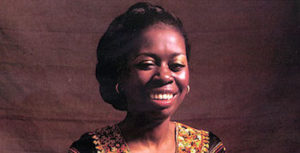
Esther Phillips
Esther Phillips was born on this date in 1935. She was a Black singer.
She began singing in church as a young child when she was born Esther Mae Jones in Galveston, Texas. When her parents divorced, she divided her time between her father in Houston and her mother in the Watts area of Los Angeles. In Los Angeles in 1949, her sister entered her in a talent show at a nightclub belonging to bluesman Johnny Otis. So impressed was Otis with the 13-year-old that he brought her into the studio for a recording session with Modern Records and added her to his live revue.
Billed as Little Esther, she scored her first success when she was teamed with the vocal quartet the Robins (who later evolved into the Coasters) on the hit single "Double Crossin' Blues.” It topped the R&B charts in early 1950 and paved the way for "Mistrustin' Blues," "Misery," "Cupid Boogie," and "Deceivin' Blues." In 1951, Little Esther and Otis had a falling out, reportedly over money, which led to her departure from his show.
In 1954, she returned to Houston to live with her father, experimenting with hard drugs and developing an addiction to heroin. Short on money, Little Esther worked in small nightclubs around the South, punctuated by periodic hospital stays in Lexington, Kentucky, stemming from her addiction.
In 1962, Kenny Rogers got her signed to his brother’s Lenox label, rediscovering her while singing at a Houston club. She re-christened herself Esther Phillips, choosing her last name from a nearby Phillips gas station. Phillips recorded a country-soul rendition of the soon-to-be standard "Release Me," a smash, topping the R&B charts and hitting the Top Ten on both the pop and country charts. Back in the public eye, Phillips recorded a country-soul album of the same name, but Lenox went bankrupt in 1963. Thanks to her recent success, Phillips could catch on with Atlantic Records.
Her remake of the Beatle's song "And I Love Him" (naturally, with the gender change) nearly made the R&B Top Ten in 1965, and the Beatles flew her to the U.K. for her first overseas performances. Encouraged, Atlantic pushed her into jazzier territory for her next album, but none of the resulting singles caught on, and the label dropped her in late 1967. With her addiction worsening, Phillips checked into a rehab facility; while undergoing treatment, she cut some sides for Roulette in 1969. Upon her release, she moved to Los Angeles and re-signed with Atlantic.
1971, she signed with producer Creed Taylor's Kudu label, a subsidiary of his hugely successful jazz-fusion imprint CTI. Her label debut, “From a Whisper to a Scream,” was released in 1972 to strong sales and highly positive reviews, particularly for her performance of Gil Scott-Heron's wrenching heroin-addiction tale, "Home Is Where the Hatred Is." Phillips recorded several more albums for Kudu over the next few years and enjoyed some of the most prolonged popularity of her career, performing in high-profile venues and numerous international jazz festivals.
In 1975, she scored her biggest hit single since "Release Me" with "What a Difference a Day Makes" (Top Ten R&B, Top 20 pop), and the accompanying album of the same name became her biggest seller yet. In 1977, Phillips left Kudu for Mercury, but none matched the commercial success of her Kudu output, and after 1981’s “A Good Black Is Hard to Crack,” she found herself without a record deal.
Esther Phillips was perhaps too versatile for her own good. Her voice had an idiosyncratic, nasal quality that often earned comparisons to Nina Simone, although she herself counted Dinah Washington as a chief inspiration. Phillips died in Los Angeles on August 7, 1984, of liver and kidney failure.
Heart & Soul:
A Celebration of Black Music Style in America 1930-1975
by Merlis Davin Seay, Forward by Etta James
Copyright 2002, Billboard Books
ISBN 0-8230-8314-4